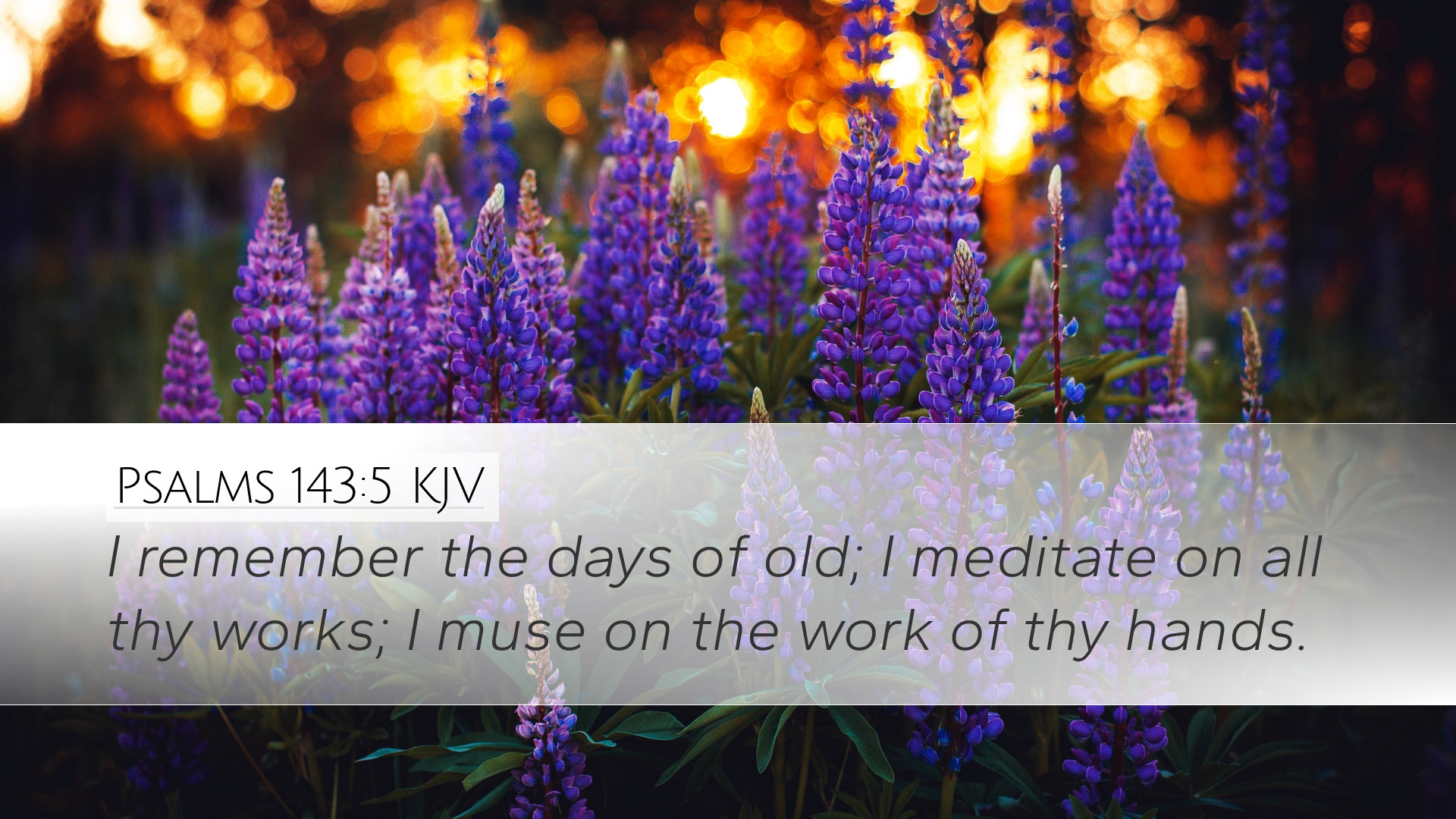Commentary on Psalms 143:5
Verse: "I remember the days of old; I meditate on all Your works; I muse on the work of Your hands." (Psalms 143:5)
Introduction
Psalms 143:5 contains profound insights into the nature of God and the human experience of memory and reflection. This verse invites believers to engage deeply with their past experiences of God's faithfulness, His creation, and His mighty works. The reflections of the psalmist reveal a heart seeking to comprehend both God's past interventions and the current struggles in life.
Exegesis of Psalms 143:5
Memory and Reflection: The act of remembering is central to the believer’s faith. The psalmist begins by recalling “the days of old,” which signifies a deliberate reflection on God's historical acts of deliverance and grace. As Matthew Henry notes, “It is our duty to take notice of the works of God in former ages; remembering these can help to strengthen our trust in Him during present trials.”
Meditation on God’s Works: The psalmist moves from memory to meditation, indicating a deep engagement with God’s actions. Albert Barnes states, “To meditate on the works of God is to consider what He has done, to trace His providence, and understand His nature.” This meditation fosters a deeper appreciation for God's attributes—His power, wisdom, and goodness.
Contemplating God’s Creation: The phrase “the work of Your hands” suggests an acknowledgment of creation and the divine craftsmanship evident in the world around us. Adam Clarke emphasizes that this reflection on the created order draws believers into a greater awareness of God’s presence and handiwork in their lives. He writes, “God's creation serves as both a canvas of His glory and a testament to His enduring grace.”
Theological Implications
Engaging in remembrance and meditation as the psalmist describes presents several theological implications:
- The Nature of God’s Faithfulness: The invocation to remember suggests God’s constancy in a changing world. The recollection of past deliverances invites believers to trust in God's unchanging character.
- The Importance of Reflection: Regular meditation on God's works is vital for spiritual health. Reflection cultivates a heart of gratitude and encourages believers during times of trial.
- Active Worship: The psalmist does not merely remember; he actively contemplates God’s works. This act of engaging with God leads to worship, which is the proper response to understanding who God is and what He has done.
Pastoral Insights
This psalm offers vital insights for pastoral care and ministry:
- Encouragement in Trials: Pastors can draw on the themes found in this verse to encourage congregants who may be struggling, reminding them to look back on past instances of God's faithfulness.
- Teaching Reflection: Churches can foster a culture of reflection and meditation through teaching, prayer, and worship practices that encourage believers to remember God’s past works.
- Personal Testimonies: Encouraging congregants to share personal testimonies of God’s faithfulness can galvanize the community and promote spiritual growth.
Practical Applications
For students, theologians, and scholars, reflecting on Psalms 143:5 can yield practical applications:
- Historical Theology: Study historical accounts of God's actions as recorded in Scripture and how they apply to contemporary faith challenges.
- Spiritual Disciplines: Implement regular practices of meditation on Scripture and prayer that center around remembering God's works.
- Community Engagement: Encourage small group discussions that focus on sharing insights about God’s work in individuals' lives and historical contexts.
Conclusion
Psalms 143:5 serves as a powerful reminder of the importance of memory and meditation in the life of faith. It calls believers to engage with their past and the works of God, fostering a spirit of worship, gratitude, and trust. As we remember the works of the Lord, we find strength and hope for the challenges we face. Through this verse, we are encouraged not only to reflect on God's historical acts but also to integrate that remembrance into our everyday lives, enriching our spiritual journey.


